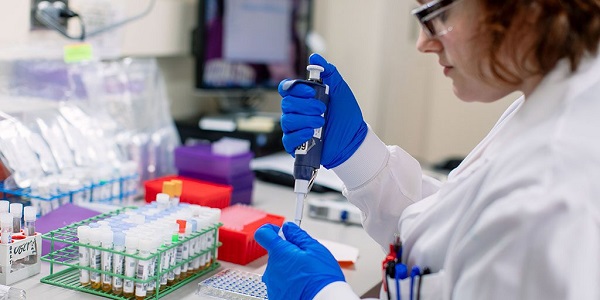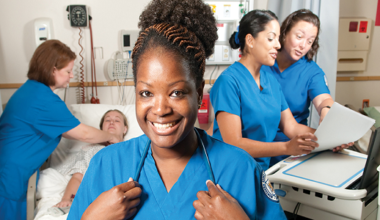List Of Career Options For Medical Laboratory Scientists – Medical laboratory science degree programs give students the practical knowledge and skills they need to analyze data and carry out successful tests in a laboratory. This training can prepare graduates for lots of careers in applied medicine, medical research, and biotechnology. If you are interested in a career that permits you to apply your critical thinking skills and carry out essential medical research, then you might decide to pursue a medical laboratory science degree.
Medical Laboratory Scientists are healthcare specialists that are highly trained in the art and technology of clinical laboratory medicine. MLS are employed in clinics, hospitals, and pharmaceutical companies. They are the detectives of the medical world and conduct diagnostic tests to help the physician in the treatment of patients.
In this article, we discuss the list of career options for medical laboratory scientists. See them below.
List Of Career Options For Medical Laboratory Scientists
- Pharmaceutical technician
- Biological Technician
- Blood Bank Technologist
- Medical Technologist
- Chemical and Materials Scientist
- Chemical Technician
- Clinical Laboratory Technicians
- Clinical Chemistry Technologist
- Cytogenetic Technician
- Medical Scientist
- Immunology Technologist
- Medical Laboratory Scientist
- Medical Laboratory Technician
-Microbiology Technologist - Pathologist Assistant
- Molecular Biology Technologist
- Histotechnician
- Veterinary Technologist and Technician
Top 10 Career Opportunities for Medical Laboratory Scientists
- Pharmaceutical technician
- Pathologist Assistant
- Clinical Laboratory Technician
- Medical Technologist
- Medical Scientists
- Nuclear Medicine Technologists
- CCytogenetic Technician
- Medical/Clinical Lab Technician
- Histotechnician
- Radiation Protection Technician
1. Pharmaceutical technician
A pharmaceutical technician assists pharmacists prepare prescription medications for customers. They work in pharmacies or drug stores, but they can also work in hospitals or outpatient clinics. Pharmaceutical technicians work with doctors and healthcare providers to make sure they give the correct prescription refill authorizations. They are responsible for filling prescriptions for patients, typing and applying labels to prescription bottles, and keeping detailed inventory records. Pharmaceutical technicians also communicate with health insurance companies to solve insurance coverage issues and assist patients to receive the treatment they need.
2. Pathologist Assistant
A pathologist assistant assists a pathologist prepare and diagnose tissue, blood, and other specimens in a sterile laboratory. Depending on the work environment, as a pathologist assistant, you might also examine corpses to determine a cause of death. The tasks of a pathologist assistant include collecting and dissecting postmortem specimens, conducting varieties of tests on samples, taking diagnostic images, and recording your findings. Some pathologist assistants may be asked to train colleagues or help with autopsies, which need some social interaction.
3. Clinical Laboratory Technician
Clinical laboratory technician prepares specimens and does automated analyzers, or conduct manual tests following specific instructions. They work while supervised by a clinical laboratory technologist. A clinical laboratory technician may work in different areas of a clinical laboratory or may specialize in a particular area.
4. Medical Technologist
Medical technologists conduct a wide variety of tests in a medical lab setting. Also called clinical laboratory scientists, they are an essential part of the healthcare team because they give doctors, nurses, and other medical staff the results and data from patient tests. This assists doctors in properly diagnosing and treating patients. Medical technologists may specialize in a specific area, including immunology, chemistry, transfusion medicine, hematology, or microbiology. Medical technologists always work in hospitals, outpatient care centers, research labs, or industrial labs. They may also work in sales for medical supplies or pharmaceutical companies.
5. Medical Scientists
Medical scientist positions require workers to hold a Ph.D., although some in this field have a medical degree. Medical scientists are in charge of designing the experiments performed by clinical and medical laboratory technologists and technicians. Medical scientists also look into the work of technicians and technologists and draft reports relevant to their findings.
6. Nuclear Medicine Technologist
A nuclear medicine technologist doeI imaging tests that assist doctors to identify abnormalities inside the body. The process entails giving patients small doses of radioactive materials and then using specialized equipment to take note of images of organs or other body parts where the substances are located. A nuclear medicine technologist will have some interaction with patients when you state procedures to them. You will also check equipment and possibly prescribe the radiopharmaceutical material, which is given orally, through inhalation, or by injection.
There are some risks in this job. You may be exposed to infectious diseases and radiation. However, you must take some measures to protect yourself.
7. Cytogenetic Technician
A cytogenetic technician is a specialist who analyzes genetic elements inside cells. Cytogenetic technicians analyze chromosomes and other genetic materials. They also maintained detailed notes for each sample such as ensuring any sample was too relevant to the correct patient. Often, you’ll research cells at a microscopic level for signs of irregularities or disease. The work is carried out in a medical facility or research institution, where there is a lab manager, and also you’re a member of a cytogenetic team.
8. Medical/Clinical Lab Technician
A medical or clinical lab technician works with integrated systems and carries out mechanical or diagnostic tests in medical laboratories. Some medical lab technicians work independently while others like to work in companies where they’re part of more extensive teams of professionals.
Medical lab technicians do a variety of tasks such as collecting samples, studying, and performing tests from bodily fluids to biopsies. They also use a lot of equipment and software programs to perform their tasks to achieve thorough and accurate tests. MLT(s) are also expected to record information they discover for review by doctors, physicians, and scientists. Maintaining and sterilizing their lab equipment are also elements of their job.
9. Histotechnician
Histotechnicians are professionals who study the minute structures of biological material and check how they are structurally and functionally related. The field entails how biochemistry, molecular biology, and physiology relate to disease processes. Like other medical laboratory technician specialties, histotechnician also study and analyze samples as well as report data to researchers, doctors, and scientists.
10. Radiation Protection Technician
Radiation protection technicians give a valuable service to overall public health. They are also known as nuclear monitoring technicians or hazardous materials removal workers. Radiation protection technicians track radiation levels and also expose leaks or potential hazards and remove them. As a socialist in this field, you may find yourself organizing evacuations of contaminated areas. The type and seriousness of the emergency depend on the protocol followed. Some RPTS focus on decontamination, emergency response or storage, and disposal. They also analyze environmental samples to determine levels of contamination.
What Is Medical Laboratory Science?
Medical laboratory science is the application of the theory and practice of science to health care. Professionals in this field conduct and analyze lots of laboratory-based tests on diverse patient specimens to make medical decisions, including the diagnosis and treatment of disease.
Moreover, medical laboratory scientists assist prepare blood or blood products for transfusions such as in the case of trauma. Medical laboratory science entails many specialty areas, such as (but not limited to): chemistry, blood banking, hematology, immunology, microbiology, molecular biology, and urinalysis. Despite the academic and technical training received by medical laboratory scientists, individuals in this field are also prepared for future opportunities in other areas, like medical writing, education, pharmaceutical research, medical illustration, and clinical research.
Conclusion
These are the list of career options for medical laboratory scientists. The most essential thing is to be diligent. At times, it feels looking for a job is a full-time endeavor. Do some work each day and be consistent with it until you find what you’re looking for. Medical laboratory science jobs are still a fast-growing field, so if you’re consistent, you will be successful.
Frequently Asked Question(s)
Can MLS become a doctor?
Medical lab scientists can become medical doctors by following the same education path as other aspiring doctors by attending medical school.
What is the best specialty in medical laboratory science?
- Microbiology.
- Hematology.
- Virology.
- Immunology.
- Histology.
How many courses are under medical laboratory science?
Courses in Medical Laboratory Science are offered under five disciplines: MLS Clinical Chemistry, MLS Haematology, MLS Histopathology, MLS Medical Microbiology, MLS Medical Parasitology/ Entomology and MLS Immunology/Immunochemistry.
What are the five types of laboratory?
- Diagnostic laboratories.
- Hospital laboratories.
- National laboratories.
- Clinical laboratories.
- Research and university laboratories.
Is medical laboratory scientist the same as medical technologist?
Medical laboratory scientists, also referred to as medical technologists, work to analyze biological specimens through scientific testing. This complex testing results in the finding of data that plays a key role in the identification and subsequent treatment of a wide variety of diseases.
Which is better? MLT or MLS?
They both work in the lab and perform tests on biological samples, however, a medical lab scientist typically has more education and is able to perform more involved lab work. A medical lab technician performs more of the routine lab work and is often supervised by a medical lab scientist.
Reference(s)
- -https://offices.nsuok.edu.ng – What can I do with a major in medical laboratory science?
- indeed.com – What Can You Do With A Medical Laboratory Science Degree?
- learn.org – What Are Some Career Options in the Laboratory Sciences?
- theapprenticedoctor.com – 8 Medical Lab Technician Careers






